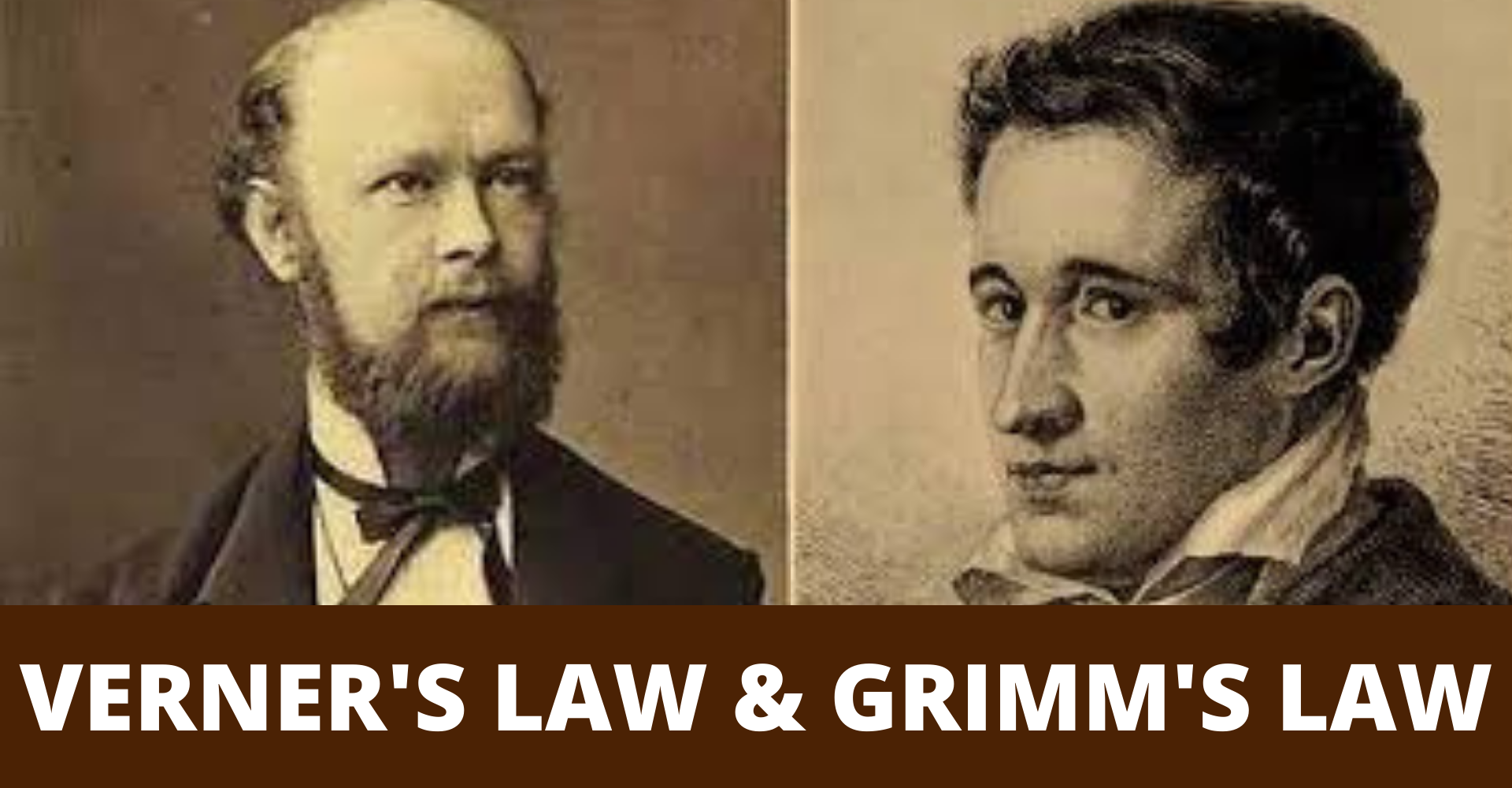VERNER’S LAW:
Grimm and his contemporizes factor, Karl Verner, a disciple of Grimm continued his research on the subject and he discover that the variable Indo-Germanic accent was responsible for the hitherto unaccountable voicing the Germanic voiceless open consonants. His discovery has been formulated into a law which has been named after his as Verner’s law.
Verner satisfactorily explains the apparent exceptions to Grimm’s law. Though Grimm has started that Indo-Germanic voiceless stop sounds (P.T.K.) become voiceless consonants (F,Q,H) in Germanic. In position other than initial these sounds are sometimes seem to be voice in Germanic. Verner explains that the reason for this voicing was the position of the Indo-Germanic accent did not fall on the vowel immediately preceding the consonants in question, these voiceless open consonants became voiced in Germanic. In west Germanic, the resulting voiced open sound was change into a voice stop sound. Thus from Indo-Germanic (t) in centum west Germanic has a ‘d’ in hundred. instead of the corresponding voiceless open sound which was to be accepted according to Grimm’s law.
English words illustrating (to show with figure) Verner’s law contain the voiced open sound in primitive Germanic. Because in the west Germanic branch the voiced open sounds were changed into voiced stopped sounds at a very early date became changed into voiced stopped sounds. Under the same conditions in which Indo-Germanic(P,T,K) became voiced open sounds in Germanic(S) was voiced to Z. Hence, we have in the four steps of the old English verb- Ceosan Ceas, Curan, Coren, the first two steps with end ‘S’ sounds and the last two steps with end ‘r’ sounds. Verner’s law is thus seem to be great importance in according for the forms of the preterite tense in many strong verbs of English.
Further we find the operation of Verner’s law in many causative verbs in English because the Indo-Germanic forms of this had their accent on the ending and not from the stamp. Thus from the verb ‘rise’ we have the causative for ‘rear’. Karl Verner by providing and explanation from the apparent exception to the sound changes formulated by his master. Grimm has been able to vindicate the claim of regularity for the sound shifting involved in Grimm’s law.
GRIMM’S LAW:
The Indo-European family of languages from which English is descended has eight branches including the Eastern one like Greek, Latin, Celtic and Teutonic. It is from the Teutonic branches. This Teutonic branch is characterized by certain distinctive features which make the languages like English and German which are descended from it to stand out from languages belonging to the other branches of the Indo-Germanic family. These distinguishing qualities of the Teutonic branches are its verbal system. In it the sound changes involved in the first sound shifting were first formulated as a law by one German Philologist named Jacob Grimm in 1822. The law formulated by Grimm has been named after him and is hence familiarly known to the students of the History of English as Grimm’s law.
Grimm discovered certain correspondences between some consonant sounds occurring in the words of the classical languages like Sanskrit, Latin and Greek and those of the Teutonic languages like English and Gothic. Grimm started that there is regular shifting of certain series of Indo-Germanic consonant sounds in Teutonic. The law which was started by Grimm referred only to the sound shifting of the Indo-Germanic voiceless stop consonants ‘p’,’t’,’k’ and ‘kw’.
In order to illustrate these sound shifting we can take words from the classical languages like Sanskrit, Latin and Greek as representative of Indo-European consonant system is best preserved in these languages. Words from old English or modern English or Gothic may be taken to represent the Teutonic sounds.
Thus we have the following changes :-
(A) Indo-European voiced aspirated stop sounds ‘bh’,’gh’,’dh’, become shifted in Teutonic to the corresponding voiced stop sounds ‘b’,’d’,’g’, that means :-
. Indo-European voiced aspirated stops sounds ‘bh’ becomes Teutonic ‘b’.
Indo-European Sanskrit Modern English(Teutonic)
Bharata —————> Brother
. Again Indo-European ‘dh’ becomes Teutonic ‘d’.
Indo-European Sanskrit Modern English(Teutonic)
Madhya —————> Middle
. Again Indo-European’gh’ becomes Teutonic ‘d’.
Indo-European Sanskrit Modern English(Teutonic)
Stigh —————> Stye
Stigh (Old English)
(B) The Indo-European voiced stop sounds ‘b’,’d’,’g’, are shifted in Teutonic to the corresponding voiceless sounds ‘p’,’t’,’k’, that means :-
. Indo-European ‘b’ changing into Teutonic ‘p’.
Lurbricus (Indo-European) —————> Sliupan (Gothic)
Slupan (Old English)
. Indo-European ‘d’ changing into Teutonic ‘t’.
Svadu (Sanskrit) —————-> Sweet (English)
. Again Indo-European ‘g’ changing into Teutonic ‘k’.
Gelu(Latin) ——–> Kalds(Gothic) ——–> Cold(Modern English)
(C) Indo-European voiceless stop sounds ‘p’,’t’,’k’,’kw’ become shifted in Teutonic to the corresponding voiceless open sounds ‘f’,’q’,’h’,’hw’.
. Indo-European ‘p’ becomes Teutonic ‘f’.
Pita(Sanskrit) ———-> Father(English)
Pancha(Sanskrit) ————> Five(English)
. Indo-European ‘t’ becomes Teutonic ‘th’.
Pita(Sanskrit) ————> Father(English)
Tres(Latin) ————> Three(English)
. Indo-European ‘k’ becomes Teutonic ‘h’.
Canis(Latin) ————> Hand(Old English)
Grimm’s law, however, did not operate under certain circumstances.
If Indo-European ‘p’ or ‘k’ happened to be followed by ‘t’, the ‘t’ remained unchanged so that from the combination ‘pt’, ‘kt’, we have in Teutonic ‘ft’, ‘ht’, Again if ‘p’,’t’,’k’, were preceded by an ‘s’ in Indo-European the combinations remained unchanged in Teutonic.
example- Stigh(Sanskrit) ———> Stigh(Old English)
Thus, we see that after the formulation of Grimm’s law it was found that there were certain apparent exception to it. In a pair of words like Latin ‘centum’ and hundred the correspondence between the ‘c'(‘k’) and ‘h’ was according to Grimm’s law but, there was no such correspondence between the ‘t’ of centum and the ‘d’ of hundred.
PLEASE HELP ME TO REACH 1000 SUBSCRIBER ON MY COOKING YT CHANNEL (CLICK HERE)











